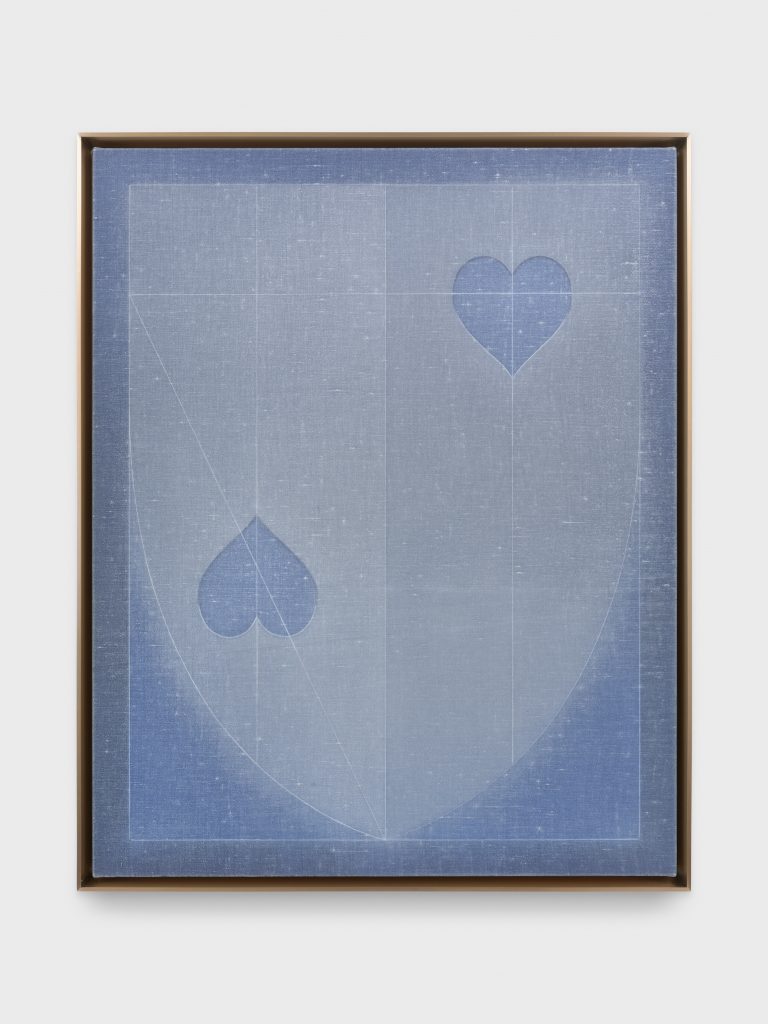“The ocean, the sky, the mountains in the distance all look blue, but when you get up close and the blue is gone,” said artist Theodora Allen during a recent phone conversation, “It’s a mysterious color. Blue is a shapeshifter.”
The Los Angeles-based artist was calling from Mexico City. She was in town for the opening of her newest exhibition “Germ” a special exhibition with Kasmin Gallery held at Casa Siza, a new gallery and residence designed by Portuguese architect Álvaro Siza.

Theodora Allen, Shield (Two of Hearts) (2023). Courtesy of the artist and Kasmin Gallery.
The show, which is Allen’s first in Mexico, brings together recent oil-on-linen paintings filled with cipher-like imagery—armor, shields, celestial geometries, seedlings—painted in a restricted palette of blues, grays, and whites, celestial hues that imbue the works with an otherworldly aura.
Over the years, Allen (b. 1985) has honed this restrained and yet potent visual lexicon which takes inspiration from myth, literature, and music along with Art Nouveau graphic arts and Symbolist motifs. The Mexico City exhibition is an awaited follow-up to “weald” Allen’s 2019 debut with Kasmin. In that show, Allen juxtaposed paintings of shields with paintings of psychotropic plants and botanical imagery, and alluded, through her varied symbols, to the tensions and overlaps between the physical world and the interior mindscape. “Germ” expands on these considerations, presenting two types of paintings—one group that depicts transcendent and precise geometries rooted in the cosmos with sharp lines, and the other group that revels in the softness of organic forms, depicting seedlings with a kind of tenderness.
Theodora Allen, Breastplate II (2023). Courtesy of the artist and Kasmin Gallery.
“This show is an extension of past considerations, which evolve from show to show,” she expained “I think of it as one sprawling body of work that just keeps being added to rather than individual series”
Set in the cool, white walls of the modernist house, Allen’s newest paintings with their mystical, and even medieval imagery, are meant to create a chapel-like experience. “One of my favorite art moments is the Fra Angelico Chapel in Florence, where you’re just alone with a painting in a room,” she said “I hope people can see the work in person and take a moment to slow down. Experiencing painting via documentation just isn’t the same.”
Theodora Allen, Constellation (Balance) (2023). Courtesy of the artist and Kasmin Gallery.
Slowness, and a mediative quality, are embedded in the works themselves. In a home studio, Allen builds her compositions up slowly, applying thin layers of oil paint to linen canvases, then continuously, and strategically removing the paint with a soft cloth. This process leaves traces of color behind while simultaneously emphasizing the weave of the linen and allowing the white of the base to shine through, creating the light in the composition.
“It’s rigorous but gentle at the same time. The process tells me when the work is ready. If I take it too far, all the light is extinguished in the work. It’s a slow process sort of feeling it out as I go and taking my time with it and paying attention to what’s happening and allowing things to happen,” she said. “It’s a balance between control and letting go.”
In many ways, Allen’s work situates itself in the art historical lineage of Hilma af Klint and William Blake, as well as American Spiritualist artists like Agnes Pelton and as well as the artists of the 1960s SoCal psychedelic art scene.
Theodora Allen, The Starry Vault (Germination) III (2023). Courtesy of the artist and Kasmin Gallery.
For Allen, this exhibition is about the transition between the past and the present. Her ciphers, centuries old in origin, find new meaning. “Every image in the show is something that’s becoming something else—it’s in process,” she explained. The three largest paintings in the show, measuring just over six feet tall, show seedlings at different stages of development. Emerging and enveloping from a blue background, the seedlings look almost like comets. Other imagery, associated albeit romantically with warfare or destruction, such as shield and armor, give way to the possibility of regeneration. “I’ve worked with imagery of shields and armor for a while, but here everything becomes a portal. It’s all very permeable. Armor is meant to protect us, but here it’s falling away,” she said. “There’s not a logical reason for these things to exist together except an idiosyncratic logic about how these things exist together, about opposing forces coexisting.”
In one painting, The Starry Vault (Germination) III, a seedling grows both up and down—a visual manifestation of “as above so, below” a phrase used in many spiritual traditions to suggest the mirroring between the microcosm and the macrocosm (a cosmic pattern repeating in the whorls of a tree, for instance). “With this work, I’ve been thinking about change and the transitional periods of life,” she said, “Growth, possibility, potential. What’s been and what’s to come.”
Follow Artnet News on Facebook:
Want to stay ahead of the art world? Subscribe to our newsletter to get the breaking news, eye-opening interviews, and incisive critical takes that drive the conversation forward.

